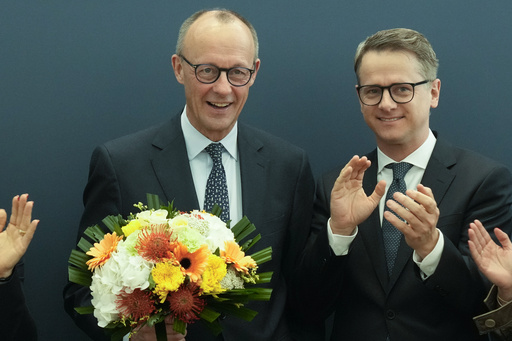BERLIN — Germany is poised for a leadership change for the second time in less than four years as Friedrich Merz of the center-right opposition emerged victorious in the recent election held on Sunday. This election not only saw a rise in support for a far-right party but also marked a significant loss for the outgoing Chancellor Olaf Scholz.
Following the breakdown of Scholz’s three-party coalition in November, Merz’s challenge is to bring stability back to Germany, the most populous nation in the European Union and its leading economic power.
Merz is faced with the formidable task of forming a government. A realistic path forward could involve a coalition with Scholz’s Social Democrats, creating a partnership between his Union bloc and the Social Democrats that holds a combined total of 328 seats in the 630-seat parliament. He aims to finalize this alliance by Easter, a timeline that presents its own set of challenges. The involved parties will have to navigate differing strategies for reviving the stagnant economy, which has faced contraction for two consecutive years, and for addressing irregular migration—a topic that Merz emphasized during his campaign. Successfully managing these conversations will likely demand negotiations and a willingness to find common ground, qualities that have been lacking in recent weeks.
Fortunately for Merz, his situation could have been more complicated. Initial reports suggested that his coalition might require the addition of a second center-left partner, the environmentalist Greens, to secure a majority in parliament.
Once dominant in post-World War II politics, both the Union and Social Democrats have experienced a decline in support over the past twenty years as the political environment shifts towards fragmentation. Their performance in the recent election was the weakest since the formation of the postwar federal republic in 1949, with the Social Democrats receiving only 16.4% of the vote and the Union achieving 28.5%, marking the second instance where the winning party received less than 30% of the vote—previously seen in 2021.
In a geographical sense, the far-right Alternative for Germany (AfD) party emerged as a significant player in the east of the country, solidifying its status in a region where it previously won its first state election last year. While the AfD faced stronger competition in the western part of Germany, which is home to most of the population, it nonetheless garnered 20.8% of the national vote, making it the highest score achieved by a far-right faction in the postwar era.
Additionally, while the AfD saw substantial gains, the Left Party experienced a surprising resurgence, going from being on the brink of political extinction at the start of the campaign to securing 8.8% of the vote. The Left Party resonated with younger voters due to its progressive stance on social and immigration issues, coupled with its advocate for taxing the wealthy, which was effectively promoted via social media. This revival was propelled by a heightened sense of polarization in the political atmosphere, especially following a parliamentary motion supported by Merz’s proposal to increase deportations of migrants, which received support from the AfD. However, since Merz’s conservatives have consistently distanced themselves from the Left Party, a coalition opportunity remains unlikely.
On matters of international support, Merz has signaled continued assistance for Ukraine amid its conflict with Russia. Through social media, he asserted that strengthening Ukraine is more crucial than ever, emphasizing that any peace agreement should include the country currently under attack. Under Chancellor Scholz, Germany became Ukraine’s second-largest supplier of arms, trailing only the United States. Merz has previously criticized the outgoing administration for its perceived inadequacies, particularly in the area of military support, advocating for the supply of long-range Taurus missiles, which Scholz did not endorse. As of now, both Merz and Scholz have maintained silence regarding Germany’s potential role in any forthcoming peacekeeping missions, indicating that such discussions may be premature.
Reflecting on the tenure of Scholz, he achieved a close victory in 2021 by positioning himself as a reliable choice. However, his administration quickly faced upheaval due to the war in Ukraine, which triggered energy and inflation crises. Over time, his coalition became associated with internal strife and ineffective communication. Recently, Scholz suggested that he might have concluded his term earlier than he did. Despite efforts to secure a renewal of support, a significant portion of the electorate, including members of his own party, had grown disenchanted with the unpopular chancellor.




